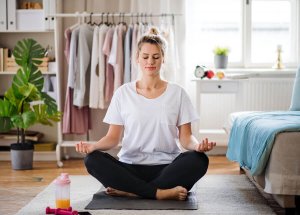10 Tips to Help Care for Your Mental Health During Confinement


Written and verified by the philosopher Isbelia Esther Farías López
The crisis that the world is facing today due to the COVID-19 pandemic has forced the population to adapt quickly to abrupt changes in lifestyle. As a result, many people have started to suffer from stress, anxiety, and panic. Is this happening to you? If so, don’t miss the following advice to help you care for your mental health during confinement.
Knowing how to cope with this situation on an emotional level is decisive in preventing detrimental consequences. Therefore, it’s a good idea to learn to perform retrospection activities that allow you to remain calm and connected to your inner self.
10 tips to care for your mental health during confinement
The constant flow of negative news regarding COVID-19 has generated various mental health problems among the population. And, of course, being in confinement doesn’t help. While some are managing to cope, others are dealing with daily anxiety, unease, and even insomnia.
The problem is that the mind becomes overwhelmed with so much news about illness and the need to handle an isolation situation that’s never been seen before. As a result, many now need to learn how to care for their minds and manage their emotions.
We’ll offer some recommendations for caring for your mental health during confinement in the article below.
1. Share
This will help you get out of your own mental confinement.
Some people feel very vulnerable in these times, such as the elderly, the self-employed, single parents, etc. Sharing your own resources with them is a great way to help people in need. Plus, at the same time, it will help you forget about your particular situation.

2. Reconnect with your family
Even though you’re in confinement physically, that’s no reason to cut yourself off socially. In fact, it’s just the opposite!
There are so many social networks and technological devices that you can use to remain in contact with those you love. Friends and family are a fundamental support network and source of encouragement in times like these.
3. Get some fresh air for better mental health during confinement
Try to get at least half an hour of sun each day. Not only will you get a nice tan, breathing fresh air is a great way to care for your mental health during confinement.
Vitamin D isn’t just important for your emotional health, it’s also important for your physical health. If you don’t have a yard, then head out on your balcony or sit near an open window. And don’t forget your sunscreen!
You may also enjoy: Relaxation Techniques During the Lockdown
4. Create a space for yourself
Find a space in your home that needs some attention and turn it into a cozy corner for yourself.
Tidying up has a positive effect on the mind, and so will having a beautifully decorated and comfortable space. You can use your new nook to read, paint, or practice any other hobby that you enjoy.
5. Do some gardening for better mental health during confinement
Whether you have a huge yard or a simple window ledge, tending to plants each day will help to clear your mind. What’s more, if you’re especially daring, you could start growing your own food!
6. Grab a book
Get lost in the pages of a new novel. There’s no better way to disconnect from the present and forget about your problems than going on a literary journey.

7. Practice meditation
Meditating doesn’t mean you have to empty your mind. Rather, it means concentrating on the here and now. If you don’t know how to do it at first, don’t worry.
You can start with guided meditations at first–there are plenty on the internet. Once you get the hang of it, you can establish your own rhythm.
8. Try pilates for better mental health during confinement
Pilates is a great exercise technique to reduce your stress load and experience overall well-being. In fact, according to a study published in Muscles, Ligaments, and Tendons Journal, it also helps you stay in shape physically.
Specifically, Pilates can improve your flexibility and care for your joint health. This is no minor detail right now since quarantine can easily lead to sedentarism.
9. Learn mindfulness
Mindfulness techniques are another tool you can use to avoid mental overload. With these methods, you simply disconnect for a moment from everything that’s going on around you and look inside you for the peace you need.
Don’t miss out: 5 Mindfulness Exercises for Better Sleep
10. Spend time with yourself
If you’ve ever felt like you never have time to spend with yourself, then this is the time for some pampering.
Being at home is the perfect excuse to care for yourself for a change. Set aside time for physical exercise, esthetic treatments, or any other activity that makes you feel good.

Care for your mental health during confinement
Finally, to care for your mental health during con confinement, take some time to reflect. You can look at this situation as an opportunity to change bad habits, care for others, and improve your habits towards to environment.
The current circumstances won’t last forever. Keep in mind that a time will come when you’ll be able to look back at these times without feeling the anxiety you’re experiencing right now. Try to relax, avoid watching the news too much, and take advantage of the time you have to do things that contribute to a sense of well-being.
All cited sources were thoroughly reviewed by our team to ensure their quality, reliability, currency, and validity. The bibliography of this article was considered reliable and of academic or scientific accuracy.
- Kloubec J. Pilates: how does it work and who needs it?. Muscles Ligaments Tendons J. 2011;1(2):61–66. Published 2011 Dec 29.
- Centers for Disease Control and Prevention. (2020). Stress and Coping. Coronavirus Disease 2019 (COVID-19). CDC. Available in https://www.cdc.gov/coronavirus/2019-ncov/daily-life-coping/managing-stress-anxiety.html
- Roy D, Tripathy S, Kar SK, Sharma N, Verma SK, Kaushal V. Study of knowledge, attitude, anxiety & perceived mental healthcare need in Indian population during COVID-19 pandemic [published online ahead of print, 2020 Apr 8]. Asian J Psychiatr. 2020;51:102083. doi:10.1016/j.ajp.2020.102083
- Lee, Sherman. (2020). Coronavirus anxiety scale: A brief mental health screener for COVID-19 related anxiety. Death Studies. 1-9. 10.1080/07481187.2020.1748481.
This text is provided for informational purposes only and does not replace consultation with a professional. If in doubt, consult your specialist.








